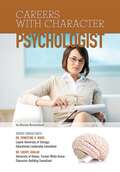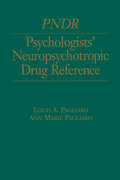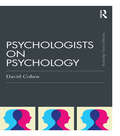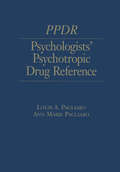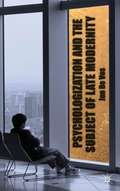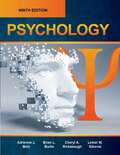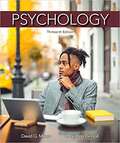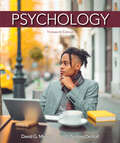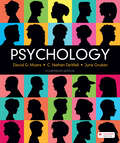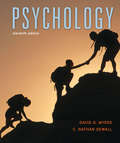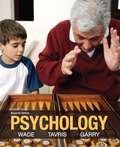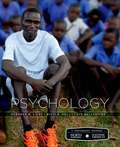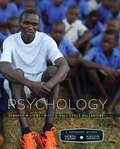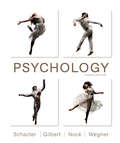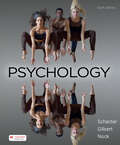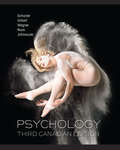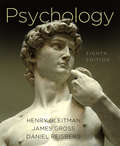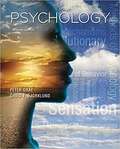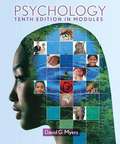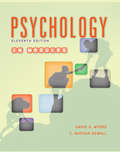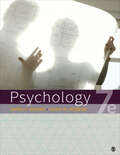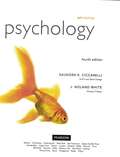- Table View
- List View
Psychologist (Careers With Character #18)
by Shirley BrinkerhoffFind out what it takes to be a psychologist with character... Psychologists can specialize in a variety of areas, including: *Experimental psychology; *Physiological psychology; *Development psychology; *Social psychology; *Clinical psychology; *School psychology; *Industrial psychology; and *Counseling psychology. Although professionals in this field need strong educational backgrounds, they also need: The diligence to follow through on long-term treatments or research... Respect and compassion for other human beings who are in emotional pain... And a sense of justice that enables them to treat each patient or client fairly. Few other professionals relate so closely with other human beings. If you pursue a career in psychology, you will have opportunities to help individuals become emotionally healthier and happier. Psychologists have the power to teach society better ways to live. Read Psychologist and find out how.
Psychologist's Neuropsychotropic Desk Reference
by Louis Pagliaro Anne PagliaroFirst published in 1999. This comprehensive neuropsychotropic drug reference is designed with prescribing psychologists and psychology students in mind. An accurate and authoritative reference, the Psychologists' Neuropsychotropic Drug Reference (PNDR) details drug monographs for over 80 different prescription neuropsychotropic drugs available for clinical prescription in North America.Each neuropsychotropic monograph is clearly and concisely written to reflect essential and important data that are commonly required by prescribing psychologists and psychology students. Thus, whenever possible and appropriate, each monograph includes: a phonetic pronunciation guide; up to five common trade or brand names; pharmacologic or therapeutic classification and subclassification; USDEA schedule designation for abuse potential; recommended dosages; and many other critical details.The form, style, and content of each monograph has been reviewed by members of an Editorial Advisory Committee of distinguished psychologists. With this quality assurance, this text is certain to become an asset to prescribing psychologists and psychology students as they strive to provide the maximum benefit of neuropsychotropic pharmacotherapy.
Psychologists on Psychology (Psychology Press & Routledge Classic Editions)
by David CohenThis is a Classic Edition of David Cohen’s unique collection of interviews with eminent psychologists, first published in 1977. The book presents conversations with thirteen of the world’s great psychologists, who dominated the subject from 1950 to 1980, and who shaped psychology as we know it today. Those interviewed include Burrhus Skinner, Donald Broadbent, Hans Eysenck and also R.D Laing, Noam Chomsky, and Niko Tinbergen. This classic edition contains a newly written introduction which contextualises the interviews as a critique and diagnosis of the problems of contemporary psychology in the mid 1970’s. Together, the interviews cover a broad range of approaches, and the lively debates about theory, practice and what it means to be human which were occurring at that time. The book shows the different approaches each psychologist has to the subject and why, in terms of background, education, experimental research and personal preference, they came to the positions they hold. The classic edition of Psychologists on Psychology provides an astute, critical snapshot of psychology at that time. It will be of great interest to anyone with an interest in psychology, the history of psychology, and the history of ideas.
Psychologists' Psychotropic Drug Reference
by Louis A. Pagliaro Ann Marie PagliaroFirst published in 1998. The purpose of this book is to provide prescribing psychologists and psychology students with an accurate and authoritative reference for psychotropic drugs that are commonly available for clinical prescription in North America. The reference is particularly directed for use by psychologists and psychology students who already have, or are currently developing, their professional expertise and responsibilities in the prescription and management of psychotropic pharmacotherapy as an adjunct to their psychotherapy. The Reference lists detailed drug monographs for over 100 different prescription psychotropic drugs available in North America. Thus, this reference is the most comprehensive psychotropic drug reference for clinical psychologists currently available. Each psychotropic monograph is clearly and concisely written to only reflect essential and important data that are commonly required by prescribing psychologists. Whenever available and appropriate, each monograph includes phonetic pronunciation, up to five common trade or brand names, pharmacologic or therapeutic classification and subclassification, United States Drug Enforcement Agency (USDEA) schedule designation for abuse potential, recommended dosages for adults, children and the elderly, helpful and important notes regarding methods of administration, relative contraindications, clinically significant drug interactions and more. It is hoped that by using the information presented in is book prescribing psychologists and psychology students will be better able to provide their patients with the maximum benefits of adjunctive pharmacotherapy with a minimum of adverse and toxic effects.
Psychologization and the Subject of Late Modernity
by Jan De VosJan De Vos's second book on psychologization argues that psychology IS psychologization, a phenomenon traced back from Late-Modernity to the Enlightenment. Engaging with seminal thinkers such La Mettrie, Husserl, Lasch and Agamben, the book teases out the limits of psychoanalysis as a critical tool.
Psychology
by Adrienne J. Betz; Brian L. Burke; Cheryl A. Rickabaugh; Lester M. SdorowPsychology, 9e is a student-friendly and accessible text that focuses on the science of psychology and its relevance to everyday life. This text introduces students to the fundamental concepts of psychology and explores the classic and current research that has provided insights into human behavior. Understanding that all psychological research takes place in a sociocultural context, the authors have integrated coverage of diversity in culture, ethnicity, and gender throughout the text.
Psychology
by Alison Clarke-Stewart Douglas A. Bernstein Edward J. Roy Louis A. PennerFor this seventh edition introductory text, Bernstein (University of South Florida) et al. add new material on applied areas of psychology and techniques for studying the brain, along with expanded material on topics related to culture and human diversity, such as ethnic differences in IQ, social and cultural factors in sexuality, and cultural aspects of emotional expression. There is also updated coverage of behavior genetics and evolutionary psychology. Special features of the text include chapter links, focus sections on critical thinking and research methods, and a behavioral genetics appendix. Annotation ©2006 Book News, Inc., Portland, OR (booknews.com)
Psychology
by Alison Clarke-Stewart Douglas A. Bernstein Edward J. Roy Louis A. PennerPsychology, 8/e, by Bernstein et al. continues to strike a balance between classical and contemporary topics with a comprehensive, research-oriented approach. The text takes an active learning approach with the use of hallmark pedagogical features such as Linkages, Focus on Research Methods, and Thinking Critically. Features new to the print program include streamlined content, integration of Positive Psychology throughout the text (by Chris Peterson, University of Michigan), and optional four-color "Neuropsychology" and "Industrial/Organizational Psychology" chapters available through Houghton Mifflin Custom Publishing. Leading-edge technology enhancements to the program include static and interactive eBooks; upgraded Flash-enabled Netlabs, Web tutorials, and animations; new interactive Concept Maps; new Active Learning and Critical Thinking Booklets; and a new DVD entitled Revealing Psychology.
Psychology
by David G. Myers C. Nathan DeWallFrom its beginnings to this remarkably fresh and current new edition, Myers and DeWall's Psychology has found extraordinarily effective ways to involve students with the remarkable research underlying our understanding of human behavior. But while the content and learning support evolves edition after edition, the text itself continues to be shaped by basic goals David Myers established at the outset, including to connect students to high-impact research, to focus on developing critical thinking skills, and to present a multicultural perspective on psychology, so students can see themselves in the context of a wider world. <p><p> This new edition offers 2100 research citations dated 2015-2020, making these the most up-to-date introductory psychology course resources available. With so many exciting new findings, and every chapter updated with current new examples and ideas, students will see the importance and value of psychological research, and how psychology can help them make sense of the world around them. <p><p> The abundant, high quality teaching and learning resources in LaunchPad and in Achieve Read & Practice, carefully matched to the text content, help students succeed, while making life easier and more enjoyable for instructors.
Psychology
by David Myers C. Nathan DeWallFrom its beginnings to this remarkably fresh and current new edition, Myers and DeWall’s Psychology has found extraordinarily effective ways to involve students with the remarkable research underlying our understanding of human behavior. But while the content and learning support evolves edition after edition, the text itself continues to be shaped by basic goals David Myers established at the outset, including to connect students to high-impact research, to focus on developing critical thinking skills, and to present a multicultural perspective on psychology, so students can see themselves in the context of a wider world.This new edition offers 2100 research citations dated 2015–2020, making these the most up-to-date introductory psychology course resources available. With so many exciting new findings, and every chapter updated with current new examples and ideas, students will see the importance and value of psychological research, and how psychology can help them make sense of the world around them. The abundant, high quality teaching and learning resources in LaunchPad and in Achieve Read & Practice, carefully matched to the text content, help students succeed, while making life easier and more enjoyable for instructors.
Psychology
by David Myers C. Nathan DeWall June GruberThe number #1 bestselling intro to psychology in an exhaustively updated new edition.
Psychology
by David G. Myers C. Nathan DewallDavid Myers' new partnership with coauthor C. Nathan DeWall matches two dedicated educators and scholars, each passionate about teaching psychological science through writing and interactive media. <p><p> With this new edition of the #1 bestselling Psychology, Myers and DeWall take full advantage of what an integrated text/media learning combination can do. New features move students from reading the chapter to actively learning online: How Would You Know puts students in the role of scientific researcher and includes tutorials on key research design principles; Assess Your Strengths self-tests help students learn a little more about themselves, and include tips about nurturing key strengths. <p> These and other innovations rest on the same foundations that have always distinguished a new David Myers edition--exhaustive updating (hundreds of new citations), captivating writing, and the merging of rigorous science with a broad human perspective that engages both the mind and heart.
Psychology
by Carol Tavris Carole Wade Maryanne GarryPsychology, 11/e, shows students why scientific and critical thinking is so important in the decisions they make. In clear, lively, warm prose, this edition continues the title's integration of gender, culture, and ethnicity. By the end, readers will learn how to interpret research and to address and resolve controversies. MyPsychLab is an integral part of the Wade/Tavris/Garry program. Engaging activities and assessments provide a teaching and learning system that helps students think like a psychologist. With MyPsychLab, students can watch videos on psychological research and applications, participate in virtual classic experiments, and develop critical thinking skills through writing. Psychology, 11/e, is available in a new DSM-5 Updated edition. To learn more, click here. This title is available in a variety of formats – digital and print. Pearson offers its titles on the devices students love through Pearson's MyLab products, CourseSmart, Amazon, and more.
Psychology
by Deborah Licht Misty Hull Coco BallantyneIn this breakthrough introduction to psychology, two committed, tech-savvy professors, Deborah Licht and Misty Hull, combine years of research and teaching insights with the journalistic skill of science writer, Coco Ballantyne, who came to this project directly from Scientific American. Together, they have created a an introductory textbook and online system that draws on written profiles and video interviews of 27 real people to help students better understand, remember, and relate to psychology’s basic ideas.
Psychology
by Coco Ballantyne Deborah M. Licht Misty G. HullThoroughly revised with input and insight from many of the hundreds of adopters of the groundbreaking first edition, Scientific American: Psychology continues to set a new standard for the introduction to psychology. Deborah Licht and Misty Hull continue to combine their years of research and teaching insights with the journalistic skill of science writer Coco Ballantyne. Together, they have created an introductory psychology resource that combines print and digital components into a seamless learning experience. The project draws on written profiles and video interviews of 27 real people to help students better understand, remember, and relate to psychology’s basic ideas. Beautifully designed, the printed text is filled with high-interest examples and features, including full-page infographics that help students understand and retain key concepts. Online, additional author-created resources, including scaffolded activities and adaptive quizzes, provide a seamless learning experience for students and a reliable assessment mechanism for instructors and programs. This innovative collaboration between Worth Publishers and Scientific American reflects a commitment to engaging and educating all students, including those who sometimes seem difficult to engage—in the contemporary style of the world’s most respected science magazine.
Psychology
by Daniel Gilbert Daniel Schacter Daniel Wegner Matthew NockThis widely used, enthusiastically received textbook is the work of one of the most accomplished author teams in introductory psychology, each a distinguished educator and researcher, and three of them (Schacter, Gilbert, and Wegner) authors of bestselling books for general readers. Together, they offer an approachable, engagingly written survey of the field’s main ideas, filled with unusual stories, memorable examples, and lots of humor to captivate all kinds of students. Again carried by the authors’ exceptional communication and teaching skills, the new edition has been retooled for the classroom chapter by chapter. Sections in each chapter now have specific Learning Outcomes in place, to emphasize “big picture” concepts and guide student learning. There is also new boxed feature called A World of Difference highlighting important research on diversity and individual differences.
Psychology
by Daniel Gilbert Daniel Schacter Daniel Wegner Matthew NockThe introductory psychology textbook that inspires a love of science.
Psychology
by Daniel M. Wegner Daniel L. Schacter Daniel T. Gilbert Matthew K. Nock Ingrid JohnsrudeSchacter, Gilbert, Wegner, and Nock's Psychology, Third Edition is widely acclaimed for captivating students with contemporary psychology research on the major topics of the introductory course, while helping them develop critical thinking skills that will stay with them beyond the course term. Expert coverage of the DSM-5, quirky examples of thinking gone awry, scenarios based on common psychological misconceptions, and contributions from new co-author Matthew Nock highlight the new edition. And now, this breakthrough text is available in a version created just for Canadian students and teachers. It offers the same fascinating writing, helpful study tools, and keen eye for intriguing stories as Psychology, Third Edition, but with a wide range of Canadian examples and impactful work by Canadian researchers incorporated throughout. Welcome Canadian author, Ingrid JohnsrudeIngrid's principal area of investigation is the neural basis of understanding speech, and she leads experiments examining how utterances are transformed into acoustic signals and then into meaning via a variety of cognitive processes. Her investigations span multiple levels--from understanding the brain structures involved in hearing and comprehension to observing the ways listeners deal with challenges such as background noise. LaunchPad, featuring LearningCurvePsychology, Third Canadian Edition has its own dedicated version of Worth's new online course space, LaunchPad. LaunchPad offers Worth's acclaimed media content, curated into prebuilt, easily assignable units, in a breakthrough interface in which power and simplicity go hand in hand. For more information, visit www. launchpadportal. com. Available in LaunchPad, the widely-praised adaptive quizzing system, LearningCurve uses brief, game-like activities to put the concept of "testing to learn" into action. Customized quizzing adapts to students' responses and provides individualized question sets at different difficulty levels (with instant feedback) based on each student's progress. For more information, visit www. learningcurveworks. com
Psychology
by Daniel Reisberg Henry Gleitman James GrossThe most intelligent book ever written for the course, reinvented for today's students. The Eighth Edition has been reorganized and streamlined to mirror the organization of today's courses, updated to include extensive coverage of the latest discoveries and research, and reimagined with new pedagogy, figures, and technology. James Gross, co-author of the text and Director of the Psychology One Teaching Program at Stanford University, believes in an integrated approach that looks at multiple perspectives to understand the larger complexities of the field. In the Eighth Edition, the authors present psychology as a central discipline that connects to the humanities as well as the exciting advances in neuroscience.
Psychology
by David F. Bjorklund Peter O. GrayPeter Gray's evolutionary perspective and emphasis on critical thinking have made his rigorous yet accessible introduction to psychology a widely respected classroom favorite, edition after edition. Now thoroughly revised, with the help of new co-author David Bjorklund, Psychology, Seventh Edition, invites and stimulates students to investigate the big ideas in psychological science.
Psychology
by David G. MyersThis modules-based version of Myers' Psychology tenth edition breaks down the book's 16 chapters into 54 short modules. The condensed text allows students to better grasp and explore psychological concepts. It also makes for more flexibility in teaching, as cross-references to other chapters have been replaced with brief explanations.
Psychology
by David G. Myers Dewall C. NathanIn this version of Psychology, Eleventh Edition, David Myers and Nathan DeWall break down the new edition's 16 chapters into 55 modules, assignable in any sequence and brief enough to be read in one sitting. It's a format favored by a wide range of students and instructors, one that's supported by substantial research showing that shorter reading assignments are more easily absorbed than longer ones. The new edition of Modules includes the same new features and content of Psychology, Eleventh Edition, and like that text, is more than ever a fully integrated text/media learning package. New features (How Would You Know; Assess Your Strengths) move students from reading the chapter to actively learning online. Those features and more are included in the book's dedicated version of Worth Publishers' breakthrough online course space, LaunchPad, which brings together a fully integrated e-Book, LearningCurve adaptive quizzing, a rich collection of student media resources, and easy setup, assessment, and course management options for instructors. What's in the LaunchPad
Psychology
by Dawn M. McBride James S. NairneJames S. Nairne and new co-author Dawn M. McBride’s best-selling Psychology, Seventh Edition offers a learning framework that follows the scientific process, connecting psychological concepts with common, everyday experiences. By first considering the purpose of psychological concepts and processes, students are prepared to understand when, why and how psychological phenomena occur in common human moments. Empirically based pedagogy—including concept reviews, self-tests, critical thinking activities, and active chapter summaries—are included throughout to promote retention, retrieval practice, and deeper thinking while guiding students to develop scientific literacy. This title is accompanied by a complete teaching and learning package.
Psychology
by Dawn M. McBride James S. NairneJames S. Nairne and new co-author Dawn M. McBride’s best-selling Psychology, Seventh Edition offers a learning framework that follows the scientific process, connecting psychological concepts with common, everyday experiences. By first considering the purpose of psychological concepts and processes, students are prepared to understand when, why and how psychological phenomena occur in common human moments. Empirically based pedagogy—including concept reviews, self-tests, critical thinking activities, and active chapter summaries—are included throughout to promote retention, retrieval practice, and deeper thinking while guiding students to develop scientific literacy. This title is accompanied by a complete teaching and learning package.
Psychology
by Saundra K. Ciccarelli J. Noland WhiteWith its engaging writing style and comprehensive coverage of key research, Psychology, 4/e, awakens students’ curiosity and energizes their desire to learn more. This title draws learners into an interactive experience of psychology. The authors establish clear learning objectives tied to the most recent APA-recommended undergraduate learning guidelines. <P><P> MyPsychLab is a valuable component to the Ciccarelli/White program. Engaging activities plus assessments provide a teaching and learning system that helps students master psychological concepts more readily. With MyPsychLab, students can develop critical thinking skills through writing, simulate classic experiments and surveys, watch videos on research and applications, and explore the Visual Brain in 3-D. <P><P> Ciccarelli/White, Psychology, 4e will provide a better teaching and learning experience–for you and your students. This program: Personalizes Learning with MyPsychLab: MyPsychLab is an online homework, tutorial, and assessment program. It helps students prepare for class and instructor gauge individual and class performance. Connects Psychology to the Real World: Students will be able to relate chapter material to their own lives. Energizes a Desire to Learn: From Chapter 1, this title provides students with ample opportunities to study from wherever they are. Embeds Interactive Content: Throughout each chapter interactive content has been fully incorporated into all aspects of the text. Psychology, Fourth Edition is also available via REVEL™, an immersive learning experience designed for the way today's students read, think, and learn.
